Thursday,July 6, 2023. Annette’s News Roundup.
I think the Roundup makes people feel not so alone.
To read an article excerpted in this Roundup, click on its blue title. Each “blue” article is hyperlinked so you can read the whole article.
Please feel free to share.
Invite at least one other person to subscribe today! buttondown.email/AnnettesNewsRoundup
_________________________
Joe is always busy.
Nothing beats Fourth of July at the White House. pic.twitter.com/qKuZmo9Uxe
— President Biden (@POTUS) July 5, 2023
Biden Hosts Sweden’s Prime Minister as the Nordic Nation Looks to Join NATO.
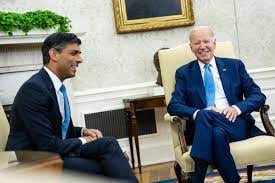
As President Biden meets with Prime Minister Ulf Kristersson of Sweden at the White House on Wednesday, both men are hoping for the Nordic nation’s swift acceptance into NATO.
But that looks highly unlikely — and the issue threatens to disrupt the alliance’s planned show of unity against Russia next week at a NATO summit in Vilnius, Lithuania.
The problem facing Mr. Biden and Mr. Kristersson is President Recep Tayyip Erdogan of Turkey. Mr. Erdogan has blocked Sweden’s membership bid, saying Sweden has harbored Kurdish exiles and refugees affiliated with the Kurdistan Workers’ Party, which Turkey considers a terrorist group.
In a statement, the White House said that Mr. Biden and Mr. Kristersson would “reaffirm their view that Sweden should join NATO as soon as possible.” To read the whole article, click here. (The New York Times)
_________________________
In Highland Park, Illinois, the Fourth of July brought painful memories.
Highland Park residents walk parade route where 7 were killed in Fourth of July shooting.
 Illinois Governor J.B. Pritzker (far left) and Senator Tammy Duckworth in a wheelchair parcipated in the commemorative walk.
Illinois Governor J.B. Pritzker (far left) and Senator Tammy Duckworth in a wheelchair parcipated in the commemorative walk.
HIGHLAND PARK, Ill. (AP) — One year after a shooter terrorized July Fourth paradegoers in Highland Park, community members gathered Tuesday to honor the seven people who were killed, commemorate the day and reclaim the space to move forward.
The city hosted a series of events aimed at giving people an opportunity to heal together. But even as hundreds of residents of the Chicago suburb convened to honor their fallen, singing the National Anthem in unison softly, other U.S. cities were reeling from a fresh spate of gun violence.
Highland Park officials said they approached the event planning with a trauma-informed perspective.
“Nobody wanted a parade. It was inappropriate,” Highland Park Mayor Nancy Rotering said. “But it was important for us to say that evil doesn’t win. And this is our parade route, and this is our community that we are taking back.”
Hundreds gathered for a Remembrance Ceremony at City Hall that included remarks from Rotering and several spiritual leaders, a musical performance and a moment of silence. Many wore matching blue shirts — the local high school’s color — that read, “We Are Highland Park.”
Attendees then walked last year’s parade route together.
The events offered no floats, performers or giveaways.
Jessica Morales, Kevin Flynn, and their two small children attended the parade last year, and scrambled inside a nearby store when they shooting began. “It was really scary,” Morales said.
They returned this year to pay their respects to the people who died and “not ignore the holiday, but remember what happened, and take the positive,” said Morales, as the couple’s 5-year-old and 1-year-old, decked out in red, white and blue, explored the busy, grassy expanse outside City Hall after the ceremony.
“We just want to keep the memory alive of what happened. It will always be with us. That’s why we come to events like this,” Morales said.
Mietra Namdari walked the half-mile parade route with her three children, 13, 11 and 7, pointing out law enforcement officers positioned on rooftops, as the shooter had been.
“They’re here to keep us safe,” she told her children.
Molly Dillon, 34, grew up in Highland Park and said she missed last year’s parade but has attended more than 25 times — “almost every year it wasn’t pouring down rain,” added Dillon’s father, Robert. This year, Molly wore a white T-shirt that said “gun control now.”
“It’s completely normal to walk that parade route. I’ve walked in it, I’ve watched it. And it’s also completely surreal and totally strange because this context is new for us,” Dillon said.
At night, the city planned to have a drone show instead of fireworks to avoid the noise that could sound like gunfire, Rotering said.
“I recognize for so many in our community, it’s too soon.”
Security was tight: Attendees had to register before each event, show a QR code and pass through security.
The day’s events were “a good way to celebrate, but remember, at the same time,” said Flynn, his young daughter in his arms.(Associated Press).
_________________________
Politics at Wimbledon.
It is not all strawberries and cream.
How Wimbledon has reacted to the return of Russian and Belarusian players.
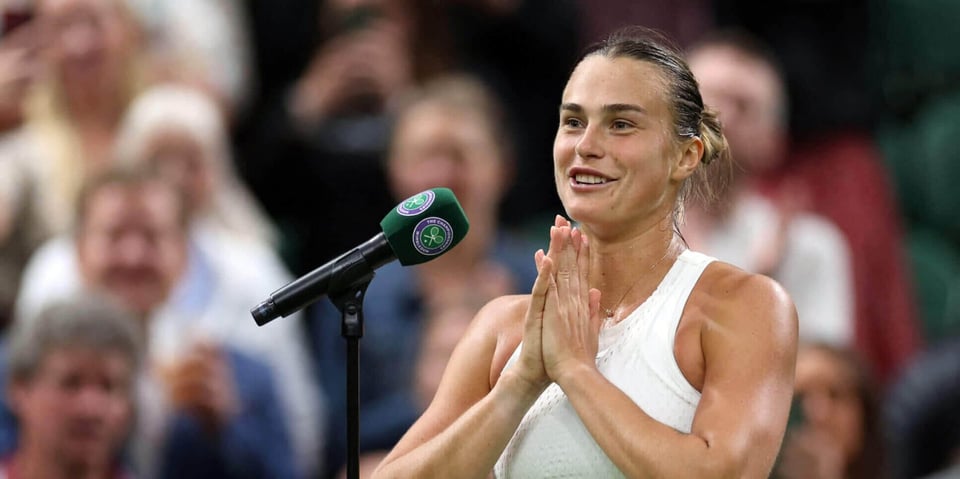
You won’t often hear booing at Wimbledon — the most likely reason is when rain stops play.
And yet no one quite knew how the return of Russian and Belarusian players, while the war in Ukraine continues, would go down with the crowd.
Monday morning brought an early litmus test when Andrey Rublev stepped on court. The Russian was greeted amicably and left to a standing ovation.
The atmosphere might not be so warm, however, in the confines of the locker room. The Athletic understands there has been frostiness between players from Ukraine, Russia and Belarus at tournaments in recent months, while players from other nations have suggested Russian and Belarusians should have been made to publicly denounce the war before being allowed to compete here.
Under pressure from the UK government last year, the All England Club banned players from those nations from taking part in response to Russia’s invasion of Ukraine. It was a decision supported by many Ukrainian players, but plenty within tennis were critical of it, particularly when it was at odds with the stance of the International Tennis Federation (ITF) and men’s and women’s tours, as well as the other three grand slams, which all allowed Russians and Belarusians to compete as neutral athletes.
Wimbledon had gone out on a limb and were punished for it. The tournament’s ranking points were removed, meaning performances at the tournament would not count towards a player’s world ranking, and Britain’s Lawn Tennis Association were fined $1million by the ATP (Association of Tennis Professionals) and $750,000 by the WTA (Women’s Tennis Association).
In March of this year, the All England Club revoked the ban — which led the WTA to halve their fine.
Eighteen players from those nations entered this tournament — six in the men’s draw and 12 in the women’s — the most high-profile of which are Daniil Medvedev (Russia) and Aryna Sabalenka (Belarus), who are both grand slam champions elsewhere.
In order to compete, those 18 players had to sign personal declarations agreeing to compete in the tournament as neutrals and to not make statements supporting the war or the regimes involved in it. Another stipulation was that they would not receive any financial assistance from either nation or state-supported businesses.
World No 3 Medvedev was full of charm on Saturday, describing Wimbledon as the best tournament in the world.
 “The first day you come, it was the same for me in juniors, you’re like, ‘Wow, that must be the best place in the world’,” he said. “Every flower seems to be in the right order, the right colour. The locker rooms are unbelievable. The food is great. I mean, the atmosphere around the site itself, the first day you always say, ‘Wow, that’s the best tournament’.”
“The first day you come, it was the same for me in juniors, you’re like, ‘Wow, that must be the best place in the world’,” he said. “Every flower seems to be in the right order, the right colour. The locker rooms are unbelievable. The food is great. I mean, the atmosphere around the site itself, the first day you always say, ‘Wow, that’s the best tournament’.”
Sabalenka is one of the favourites to win the women’s singles and brushed past Panna Udvardy, of Hungary, in 62 minutes on Centre Court on Tuesday. She was given a warm reception and there were plenty of cheers after a comprehensive win.
Speaking on court after, she said: “I didn’t realise how much I missed this place until this match. Thank you everyone for coming and supporting, it really means a lot to me. Thank you.
“It was a great match. I was just trying to do my best. I was enjoying the atmosphere, enjoying the game. I missed this place a lot, I think that’s why I played my best tennis today.
“I feel great. I’m feeling good. It is really good to be one of the favourites in this beautiful tournament and I will do my best to see if I can get as far as I can here in Wimbledon.”
Do not expect to hear her mention the war, though. The world No 2 announced before the tournament that she would not address questions on politics after being repeatedly grilled about the Belarusian leader, Alexander Lukashenko, by a journalist at Roland Garros.
Sabalenka has been pictured in the past with Lukashenko, a firm ally of Russian president Vladimir Putin. When pushed if she supports Lukashenko, she said: “It’s a tough question. I don’t support war, meaning I don’t support Lukashenko right now.”
She skipped the post-match questions in Paris twice after that, saying the exchange with the reporter had made her feel unsafe.
In her pre-Wimbledon press conference on Saturday, the 25-year-old said: “Before we continue, I would like to say I’m not going to talk about politics. I’m here to talk about tennis only. Please respect that. If you have any kind of political questions, you can ask WTA or the tournament. They can send you the transcript of my answers from the previous tournaments.”
Others, such as Rublev and Daria Kasatkina (both Russian), have confronted the topic head-on since the war started in February 2022.
Rublev, the seventh seed here, was the first Russian back on court at Wimbledon. He was also one of the first Russian players to speak out against the invasion of Ukraine last spring.
On his way to winning the Dubai Tennis Championships in February 2022, Rublev wrote “No War Please” on the lens of one of the on-court cameras after his semi-final win against Hubert Hurkacz. He reiterated his anti-war stance this year at the same tournament.
At the French Open earlier this year, Elina Svitolina, the Ukrainian world No 76, said: “I’m really thankful for the position that she (Kasatkina) took. She’s a really brave person to say it publicly, that not so many players did.”
And then last week at Eastbourne, one of the warm-up grass events before Wimbledon, Kasatkina was hugged by a spectator for her bravery.
“I want to be able to respect myself when I look in the mirror and if being a good person means I have to sacrifice my home, that’s my choice,” she told The Sunday Times shortly before Wimbledon. “That person hugging me (in Eastbourne) meant a lot because it was a big risk for me to condemn the war, especially considering my parents are still there, but I couldn’t just stay silent and pretend everything’s OK.”
“It’s unsafe for me now with the regime we have — as a gay person who opposes the war, it’s not possible to go back.”
She said she did not regret her decision “even 1 per cent” to give that interview and that the outbreak of war had made her feel overwhelmed and determined not to hide who she was.
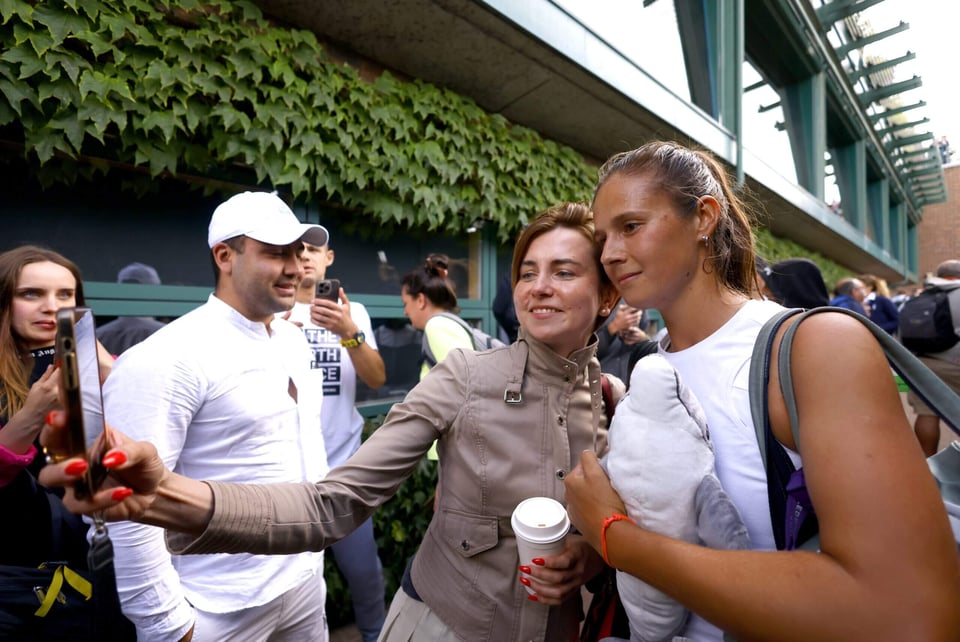
Victoria Azarenka (Belarus) has twice reached the final at Wimbledon and beat Yue Yuan early on day one. She said afterwards that she did not know how she’d feel on her return to SW19.
“I don’t know if we can be fully like, ‘Let’s move on and forget about everything that happened (referring to the ban)’,” Azarenka told The Athletic. “I think that’s going to take a little bit of time to do that and we have to be sensitive to what’s going on in the world.
“However, in the moment, I have to be able to do my job. That’s why I’m here. People come here to watch tennis. The two weeks here, it becomes a completely different place. When I was practising in the last two weeks, I’ve been anticipating, ‘Oh, I don’t know how it’s going to feel’. I didn’t really feel anything besides being excited. I’m here, I’m playing. It’s been very tough personally to keep my head present and focus on myself — at least while I’m on the court — but I hope I’m going to be able to do that while I’m here because it’s not easy to deal with a lot of things that are going on in the world.”
Russian tennis player Andrey Rublev signs 'no war please' on a camera following his win at the Dubai Tennis Championships 💙💛 pic.twitter.com/zVUbT89vIx
— Sky Sports News (@SkySportsNews) February 26, 2022
The 25-year-old was greeted with warm applause on No 3 Court, where he beat Max Purcell in straight sets to reach the second round. Afterwards, he said he was glad to be back, though repeated his belief that the organisers had “better options” last year when they put the ban in place.
“I feel really happy to be back because I didn’t play much Wimbledon, or I was injured, or there was the pandemic, or then they ban us,” he said. “So, of course, it feels really special and I feel really happy to be back in London to play at one of the best tournaments. To get a win today was a nice moment.”
Speaking about the ban, he said: “If we really want to help or do what is better for tennis and for people, I think obviously there were better options. Not just to ban (us) because in the end (it made) no difference. They (Wimbledon) did only worse to themselves.
“For sure, there were options to do much better for everyone (in the past he has suggested all prize money by Russian and Belarusian players should be donated to charity), but it is what it is. Now we are here and, like I said, I’m really happy to be back and to compete.”
Kasatkina, the world No 10, has gone to great lengths in public to reiterate her opposition to Russia’s actions. In July last year, she gave a video interview to the Russian blogger Vitya Kravchenko in which she criticised the war and came out as gay — speaking out against attitudes towards homosexuality and restrictions on LGBTQ+ rights in her home country. The interview finished with Kasatkina in tears at the prospect of not being able to return to Russia in the future because of her sexuality.
Veronika Kudermetova, the Russian 12th seed who beat Estonia’s Kaia Kanepi in straight sets, said some Ukrainian players ignore her in the locker room.
“I say hi to them,” she said. “I say hi. Some people, they reply; some do not. Like others, I just say here we are just a tennis player. It’s like that.
“The crowd was very good for me. They support me. I think it doesn’t matter from which country you are, we are here as just tennis players. We are here to compete and try to show our best.”
At recent tournaments, players from Russia and Ukraine have been seen staring at their phones to avoid acknowledging each other.
There is a definite awkwardness between players from those nations and some event organisers have purposefully kept them away from each other behind the scenes.
Asked on the first morning about the return of players from Russia and Belarus, the chief executive of the All England Club, Sally Bolton, said: “It’s the right decision for the championships this year. All of those athletes are competing as neutrals, they’ve all signed the declaration.”
Fans cannot bring Russian or Belarusian flags into the grounds and none of the broadcast pictures from Wimbledon will be shown in either country and no merchandise will be sold there.
During her win on Monday, the women’s world No 1, Iga Swiatek, wore a ribbon on her cap with the colours of the Ukraine flag in a show of solidarity for the victims of the war.
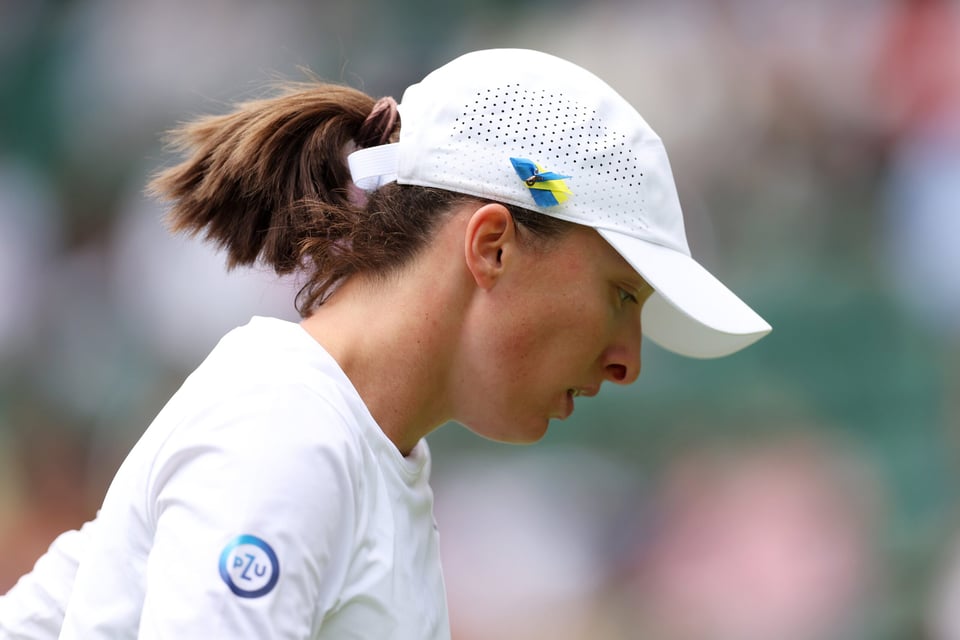
The tournament organisers have assisted Ukrainian players with accommodation and practice facilities during the grass-court season and have invited refugees from the country to the tournament.
Wimbledon are donating a pound from every ticket sold during the fortnight to support Ukraine, via the Red Cross, which should amount to a sum of around £500,000.
Some players think Wimbledon did not go far enough, believing the Russian and Belarusian players are saying what people want to hear and that behind the scenes they are supportive of the invasion of Ukraine.
Speaking last month to The Athletic, Barbora Krejcikova, the No 1 seed in the women’s doubles at Wimbledon and a former French Open singles champion, said: “I feel that there are players that secretly support it (Russia’s invasion of Ukraine). They support it just because it’s their country. So they support what’s happening there. And… it’s just not public. And then I know that there are some players that are trying to get away from that and trying to just even publicly tell you what they think and how they feel (such as Rublev and Kasatkina).
“Politics and sport — you can’t separate it. It’s always going to be connected together.”
Barbora Strycova, the Czech doubles specialist and one-time Wimbledon singles semi-finalist, told The Athletic before Wimbledon that players from those nations should have had to sign something publicly to say they are against the invasion of Ukraine before they were granted permission to play.
“I would let them (the Russians and Belarusians) play, but I also would like to know how they feel,” she said. “And have them sign something that they are against the war. Then we have a clear answer. We know they are against it.
“Sabalenka didn’t go for the press conference, which was, for me, it was kind of like, ‘I think you should go. You should be talking about it. We should hear from you. You are a star and we should hear your opinions’.”
While the highest-ranked Ukrainian men’s player, Oleksii Krutykh (world No 182), lost in the first round of qualifying, there are five women in the top 100 and all were present at Wimbledon. They have frequently voiced their opposition to Russia’s invasion and the treatment of their compatriots, detailing the awful situations that many of their relatives find themselves in back in Ukraine.
Speaking before the tournament, world No 26, Anhelina Kalinina, told The Athletic: “It’s not hard to answer questions (about Russia’s Wimbledon ban). It’s hard talking with my family. For me, the toughest thing is when I call my mother, my father, my brother, my grandparents. They are living in a horrible, horrible situation and this is what’s horrible — not me sitting in Britain playing tennis on grass.
“Thank god I can enjoy this beautiful sport. But people there, they’re basically trying to survive and that’s what matters, not what’s happening here. We’re fighting on our own field for our country. In Ukraine, the soldiers are doing their bit and fighting for us. We’re blessed to have them and so much support. Ukrainians are united in this way.”
Kalinina plays Jessica Bouzas Maneiro, of Spain, in the first round on Wednesday.
Her compatriot Svitolina beat Venus Williams in straight sets on Centre Court on Monday and spoke afterwards about her family back home in Ukraine and how they are constantly in her thoughts.
“When I wake up, I always check the news. Every moment that I’m not on the court I’m checking how my family is doing, how the situation is in Ukraine, monitoring all the time what is happening and how me and my foundation, the team around me, how we can help in that particular moment for some kids, for my family, for friends, for anyone.
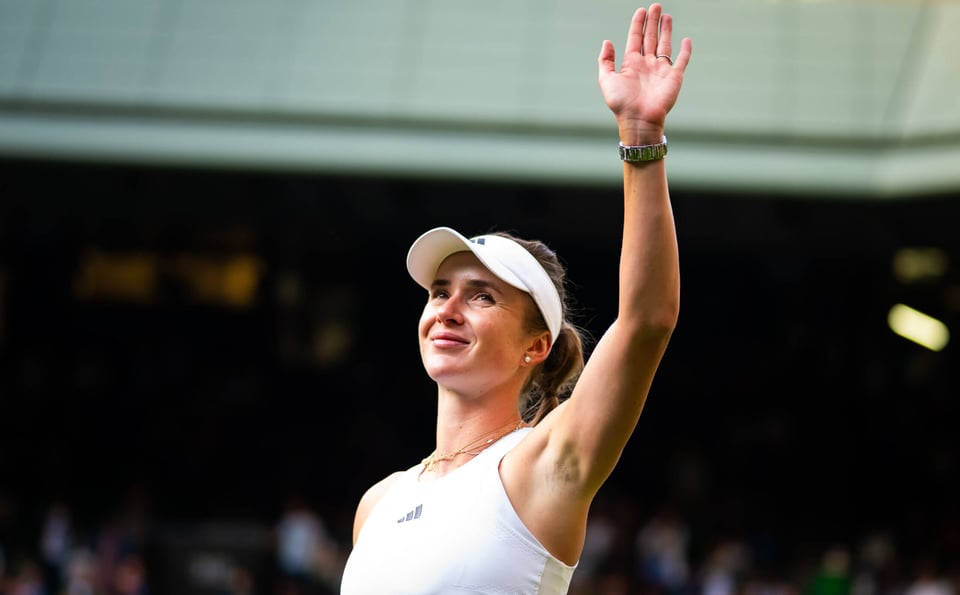
Svitolina Defeated Venus Williams in the first round of the 2023 tournament.
The Elina Svitolina Foundation was established in 2019 to help talented tennis players in Ukraine fulfil their potential. The war has stopped their work in that country, so for now, the foundation is supporting young tennis players who have left Ukraine and are living around Europe, providing accommodation, food and training.
“With my grandmother, I speak pretty much every day,” she explained. “My dad was there, as well in Ukraine, so I chat with him and speak when I can get a moment, always checking on them.
“My dad goes back and forward travelling. My grandmother stays there. She’s over 85 years old, so it’s difficult for her to travel. Her health is not good enough to go out of Ukraine. She loves home. It would be impossible for her to leave the city, even.”
It should not be forgotten that when the war began, three of Ukraine’s greatest-ever men’s players were quick to sign up to defend their country.
Two months after retiring from the sport, Sergiy Stakhovsky, who beat Roger Federer here 10 years ago on Centre Court, had joined the Ukrainian forces. Soon after, Andrei Medvedev, a 1999 French Open finalist, and Alexandr Dolgopolov, a former top-15 player, had done the same.
Used to be rackets and strings, now this🙄🙏🏻🇺🇦 pic.twitter.com/hdYjMDlMuo
— Alex Dolgopolov (@TheDolgo) March 16, 2022
“Last year, Wimbledon showed great bravery,” Stakhovsky told The Observer last week. “They were pioneering in terms of what should be right and what should be wrong. Unfortunately, they didn’t find any support within their own ranks. I’m talking about grand slam tournaments.”
Rain played havoc with the second day at Wimbledon, but six of the eight Russian and Belarusian players that have completed their first-round matches are into the next round. Ten more will, weather permitting, get their chance on Wednesday.
Two Russians will take centre stage at lunchtime. Kasatkina faces British hopeful Jodie Burrage in the first match on Centre Court, while Medvedev opens on No 1 Court against another Brit, Arthur Fery. (The Athletic).
48 years ago today, on July 5, 1975, Arthur Ashe became the first Black man to win a #Wimbledon singles title.
— Billie Jean King (@BillieJeanKing) July 5, 2023
That same year, I won the Wimbledon women’s singles title, and we shared a dance together at the ball.#HistoryMatters
📷: Alamy pic.twitter.com/8KiGrH5t2D
One more thing - The nomenclature at the U.S. Open offers a permanent tribute to these two tennis giants: in 2006, the United States Tennis Association’s National Tennis Center in Flushing Meadows-Corona Park, home of the Open, was rededicated as the USTA Billie Jean King National Center; since its opening, the great stadium at the Center has been the Arthur Ashe Stadium.
Joyce Vance Speaks.
Joyce Vance, Distinguished Professor of the Practice of Law at the University of Alabama, served as the United States attorney for the Northern District of Alabama from 2009-2017. She was one of the first five U.S. attorneys, and the first female U.S. attorney, nominated by President Barack Obama. She is also a commentator at MSNBC.
Why the filing against Legacy, Athletes and Donor Admissions is a complaint, not a law suit.
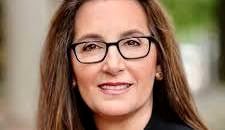
A group of students have filed a complaint with the Department of Education, challenging Harvard’s use of legacy and donor status to give applicants a preference in admissions.
This is not a lawsuit filed in federal court, it’s a complaint filed with an executive branch agency. That was the right approach here, and it’s worth taking a moment to understand why, as challenges of this type begin to percolate. Why not just file a lawsuit in federal court?
The affirmative cases the Supreme Court just decided alleged Harvard and the University of North Carolina engaged in intentional discrimination, the affirmative use of race as criteria for admissions. Individuals are entitled to challenge intentional discrimination in court under Title VI of the Civil Rights Act and the Fourteenth Amendment. But challenges to legacy status, at least so far, aren’t about intentional discrimination. They’re “disparate impact” claims, which means they are objections to a law or practice has the effect of discrimination against certain protected groups, here, Black students and other minorities, regardless of the intent of the people who adopted the approach. We see disparate impact claims frequently in areas like employment and the adoption of laws and practices that make it difficult to vote or to register to vote.
Title VI of the Civil Rights Act prohibits recipients of federal financial assistance from discriminating based on race, color, or national origin both in and outside of the classroom. It applies to elementary, secondary, and postsecondary schools in all 50 states, the District of Columbia, Puerto Rico, and U.S. territories. But there’s a hitch. A 2001 Supreme Court case, Alexander v. Sandoval, questioned whether there was any private right—whether individuals could file lawsuits like the plaintiffs in the affirmative action cases did on their own behalf—for disparate impact claims under Title VI. Sandovalmeans that disparate impact claims like the ones here must be brought by a plaintiff like the Department of Education. So, bringing this complaint directly to the Department of Education is a first step towards officially teeing up the issue. It’s likely the Department will receive complaints from additional groups identifying additional institutions of higher education.
The Department of Education has an office that is specifically tasked with working on issues like this and filing lawsuits where appropriate, the Office for Civil Rights (OCR). For almost six decades, the OCR at Education, working with DOJ lawyers, has enforced Title VI the regulations that implement it. My experiences working with OCRs across federal agencies as the U.S. Attorney in North Alabama taught me that these folks are committed professionals. The OCR at Education has a demonstrated commitment to their mandate of ensuring equal opportunity for students who experience discrimination based on race, color, national origin, disability, age, and sex, including sexual orientation and gender identity. They work with a laser focus.
The Leadership Conference on Human and Civil Rights has been tracking statistics on preferential admissions that lay bare the disparate impact practices like legacy consideration result in:
· At Harvard, University of Pennsylvania, Dartmouth, Georgetown, Cornell, University of Southern California and the University of Virginia, legacies are “admitted at twice the rate of other applicants.
· The vast bulk of recruited athletes getting a leg up in admissions are in sports like crew, fencing, squash, and sailing, sports that aren’t offered at public high schools or available to most low-income students, particularly students of color. Student athletes are often admitted despite having weaker academic credentials than other students, with one analysis of 90,000 students at selective colleges and universities estimating that recruited athletes are as much as four times as likely to be admitted as other similarly qualified applicants.
· Many selective schools make big dollar donations a factor in admissions. Journalist Daniel Golden reported that Harvard’s formal system for advancing children of its wealthiest donors, resulted in, “an astonishing enrollment rate of one child per major donor.”
· More than 43 percent of white students admitted to Harvardbetween 2009 and 2014 fell into four preferential categories: athletes, legacies (the children of alumni), the children of big donors or faculty and staff children.
· Alumni children are up to eight times more likely to be accepted at elite colleges, according to one estimate. Another study at an unnamed elite Northeastern college found that so many legacy students had been admitted that they outnumbered the number of Hispanic students. (Joyce Vance, Civil Discourse)
_________________________
Attention must be paid. A champion for women has died.
Dr. Susan Love, Surgeon and Breast Health Advocate, Dies at 75.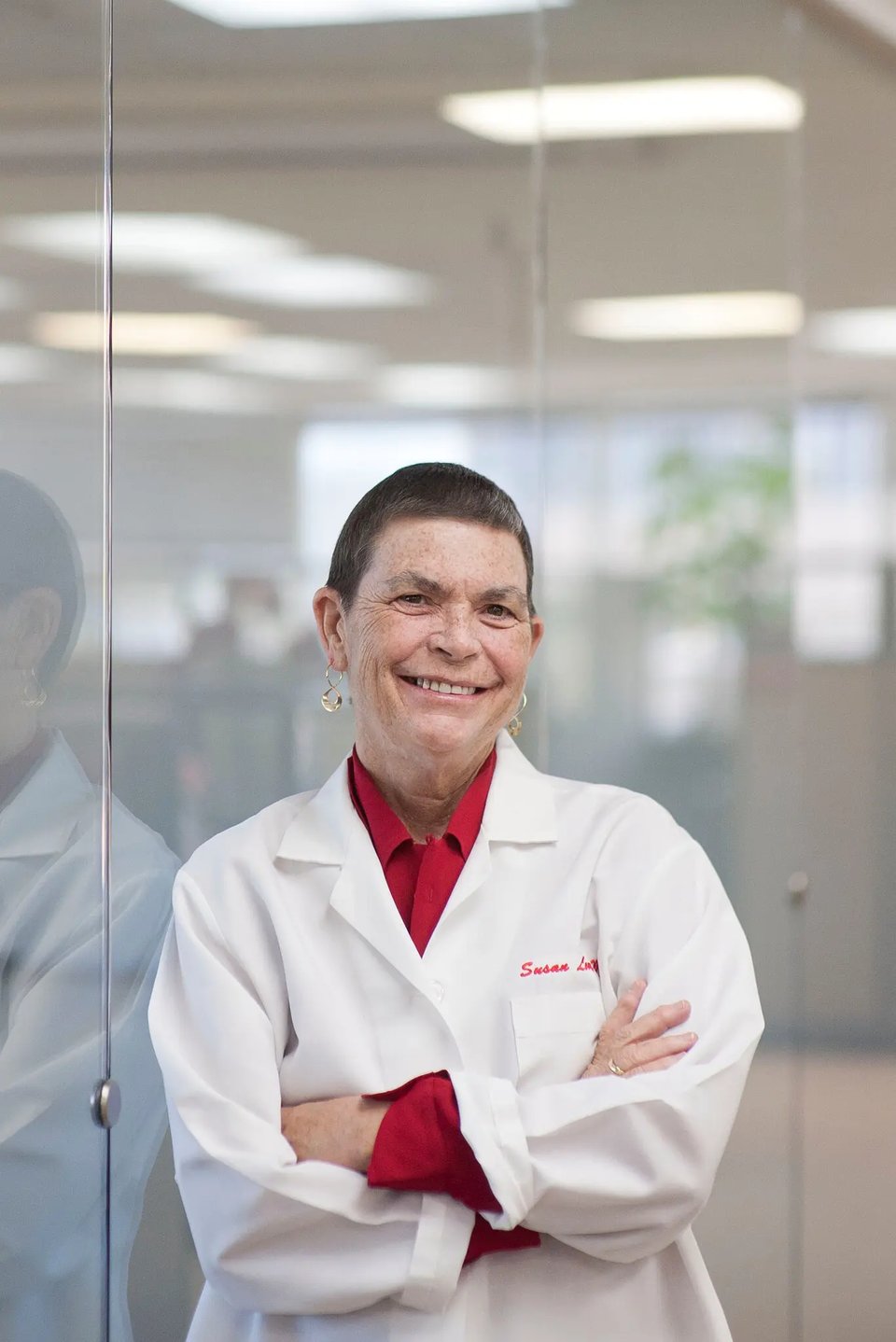
Dr. Susan Love, a surgeon, author, researcher and activist who was for decades one of the world’s most visible public faces in the war on breast cancer, died on Sunday at her home in Los Angeles. She was 75.
The cause was a recurrence of leukemia, said Allie Cormier, the chief marketing officer at the Dr. Susan Love Foundation for Breast Cancer Research.
Ubiquitous, energetic, forthright (some critics said brash) and at times controversial, Dr. Love, it was generally agreed, helped reshape both the doctor’s role and the patient’s with respect to the treatment of breast cancer, which kills more than 43,000 women in the United States annually.
A former faculty member at the medical schools of Harvard and the University of California, Los Angeles, Dr. Love was a founder of the National Breast Cancer Coalition, an advocacy group, in 1991. At her death, she was chief visionary officer of the Dr. Susan Love Foundation, a nonprofit organization that conducts and finances breast cancer research.
Though Dr. Love retired from active surgical practice in 1996, she remained influential through her writings, her lectures and her many television appearances.
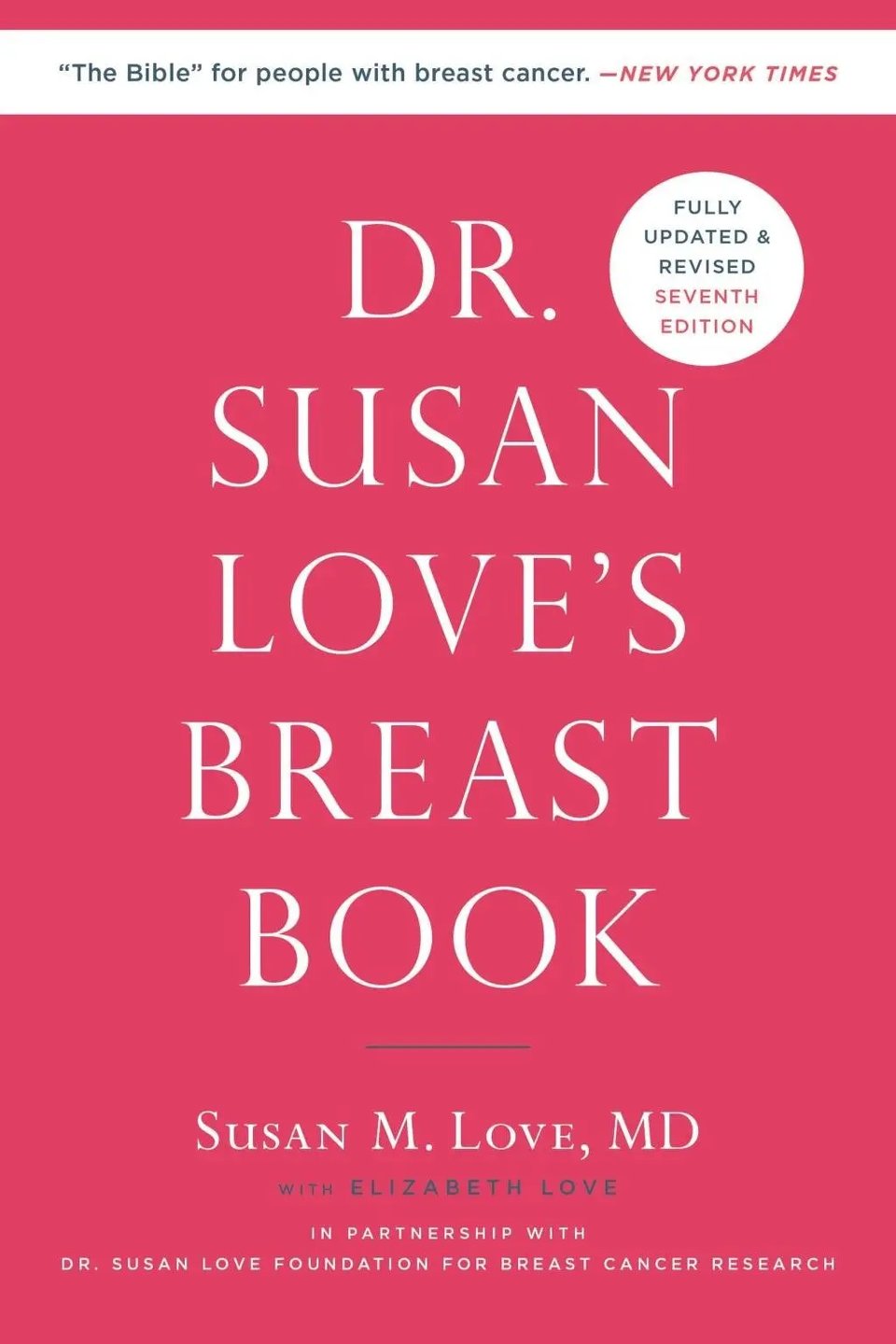
She was known in particular for a book for lay readers, “Dr. Susan Love’s Breast Book,” written with Karen Lindsey. Originally published in 1990 and now in its sixth edition, it has sold nearly half a million copies and has long been a de facto bible for breast cancer patients. A seventh edition is scheduled to be published this fall.
She was herself a central figure in a well-received nonfiction book, “To Dance With the Devil” (1997), an account by Karen Stabiner of the fight against breast cancer.
Dr. Love — who began her medical career as a general surgeon and had previously planned to be a Roman Catholic nun — realized early on that the fight against breast cancer would entail political as well as medical battles. By temperament and training, she seemed well armed for both.
She did not suffer fools gladly, and her opinions often pushed against the tide of medical orthodoxy. In an era when surgeons were overwhelmingly male and deference by their female patients was still expected, she exhorted women to ask hard questions about their treatment.
Where tradition favored cutting, Dr. Love favored conservation. She frequently denounced a standard late-20th-century treatment protocol — mastectomy, radiation and chemotherapy — as “slash, burn and poison,” instead advocating lumpectomy followed by radiation whenever possible.
“Wanting to keep your breast is not about vanity,” she said in an interview with Technology Review magazine in 1993. “It’s about being intact as a person.”
Dr. Love was also adamant about what she saw as the limited utility of mammograms in detecting cancer in younger women. (Younger women’s breast tissue is denser and therefore less likely to yield visible clues.) Where annual mammograms have long been recommended for women over 40, she argued that most women can wait until they are 50, a stance that has not found universal favor with the medical community. (This May, the U.S. Preventive Services Task Force, alarmed by an increase in breast cancer diagnoses among younger women, recommended that women start getting regular mammograms at 40 rather than treating it as an individual decision until age 50.)
In the 1990s, amid the mass entry into middle age of women of the baby-boom generation, Dr. Love ignited controversy with her less-than-enthusiastic appraisal of hormone replacement therapy, then routinely recommended to treat menopausal symptoms. Her position was vindicated some years later, when the therapy was found to increase the risk of breast cancer, heart disease and strokes.
She did few things by half measures. After realizing as a young doctor that she was a lesbian, she chose to come out of the closet at a time when being openly gay carried grave professional and personal risks. She felt an obligation to do so, she said, so she could serve as a role model for others.
Her vision for breast cancer was no less expansive. What she ultimately wanted, she often said, was not so much to cure the disease as to vanquish it altogether by isolating its causes and pre-empting them at a cellular level.
As plain-spoken as Dr. Love could be in public, she was known for the immense private tenderness she displayed toward her patients. Many news-media profiles of her recounted her habit of standing alongside a patient just before surgery began, holding her hand and talking softly to her as the anesthesia took effect.
Susan Margaret Love was born in Long Branch, N.J., on Feb. 9, 1948. Her father, James Arthur Love, was a salesman for an industrial manufacturer, and she grew up first in Puerto Rico and then in Mexico, where his job took the family. Her mother was Margaret Connick Schwab.
After two years at the College of Notre Dame of Maryland, she entered the convent of the School Sisters of Notre Dame in New York City. But she bristled at its confines and left after a few months.
She finished her bachelor’s degree at Fordham University, earned an M.D. from the Downstate College of Medicine of the State University of New York in 1974 and did her surgical residency at Beth Israel Hospital in Boston. (She also received an M.B.A. from U.C.L.A. in 1998.)
Acutely conscious of being a woman in a male-dominated medical specialty, Dr. Love made a vow, she recalled in an interview with People magazine in 1994: “I am not going to let them turn me into a breast surgeon.”
“I could do the big operations just as well as they could,” she said.
But the breast patients came anyway, referred by male surgeons disinclined to take them on.
“I started to realize how women weren’t getting information,” Dr. Love told People. “If they came in with a lump or what they thought was a lump, the doctor would say, ‘Don’t worry your little head about that, dear.’ Most of these patients were scared to death. I realized I could make a contribution.”
She became an assistant clinical professor of surgery at Harvard in 1987. The next year she founded the Faulkner Breast Center, a Boston clinic whose medical staff was almost entirely female.
In 1992, Dr. Love joined the David Geffen School of Medicine at U.C.L.A. and established a clinic, the U.C.L.A. Breast Center, which she directed. (Now known as the Revlon/U.C.L.A. Breast Center, it is a hub for treatment and research.)
Over time, her teeming schedule of interviews and public appearances, and the absences they involved, caused tension among colleagues at the breast center. She resigned from the center in 1996, though she continued to teach part time at U.C.L.A., where at her death she was a volunteer clinical professor.
Dr. Love became associated with the Santa Barbara Breast Cancer Institute, a research center, in the mid-1990s. Now based in Santa Monica, Calif., it was renamed after her in 2004.
The foundation’s projects include the Love Research Army(formerly the Love/Avon Army of Women), an initiative begun by Dr. Love that recruits volunteers from around the world to participate in breast-cancer studies; to date, more than 360,000 people have enrolled, including some men interested in learning about the disease.
Dr. Love is survived by her wife, Dr. Helen Sperry Cooksey, a surgeon, whom she married in San Francisco in 2004 during the brief period when same-sex marriages were being performed there, before a California ballot proposition made them illegal in 2008. Also surviving is their daughter, Katie Patton-LoveCooksey, whose adoption by her two mothers in 1993 — Dr. Love was the biological mother; both women reared her from birth — was the first granted to a same-sex couple in Massachusetts. In addition, Dr. Love is survived by two sisters, Christine Adcock and Elizabeth Love, and a brother, Michael James Love. (New York Times).
______________________
Perhaps there is Movement on freeing Putin detained journalist, Evan Gershkovich.
Kremlin open to talks over potential prisoner swap involving detained US reporter Evan Gershkovich.
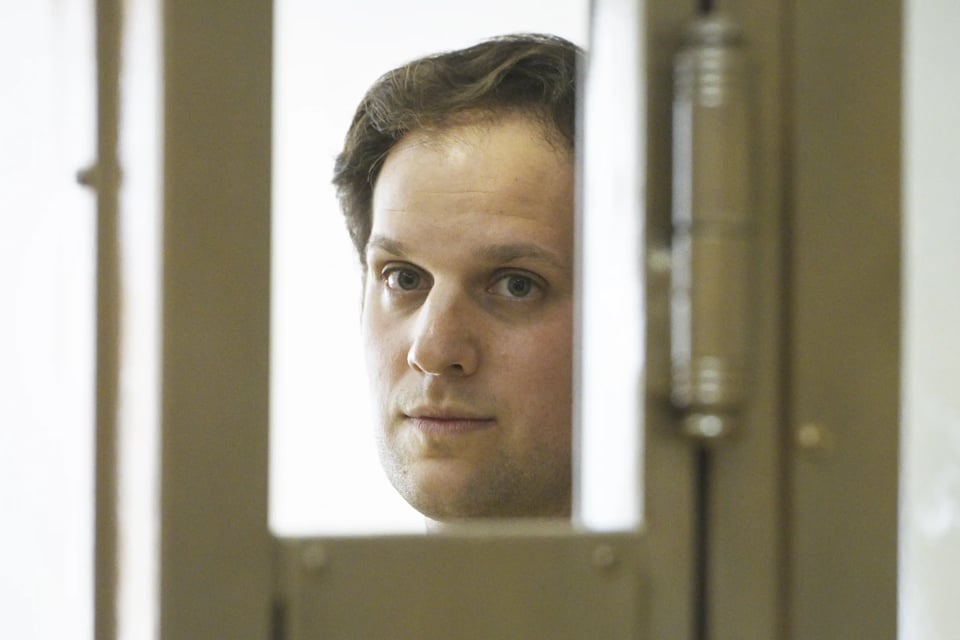
MOSCOW (AP) — The Kremlin on Tuesday held the door open for contacts with the U.S. regarding a possible prisoner exchange that could potentially involve jailed Wall Street Journal reporter Evan Gershkovich, but reaffirmed that such talks must be held out of the public eye.
Asked whether Monday’s consular visits to Gershkovich, who has been held behind bars in Moscow since March on charges of espionage, and Vladimir Dunaev, a Russian citizen in U.S. custody on cybercrime charges, could potentially herald a prisoner swap, Kremlin spokesman Dmitry Peskov said that Moscow and Washington have touched on the issue.
“We have said that there have been certain contacts on the subject, but we don’t want them to be discussed in public,” Peskov said in a conference call with reporters. “They must be carried out and continue in complete silence.” (Associated Press).
_________________________
For your files and your use.
Contact all members of Congress:
By phone: (202) 224-3121
By email: democracy.io
By US mail: Representatives / Senators
By fax: Representatives / Senators
By Resistbot: Resist.bot
Contact White House or other federal agencies:
_________________________